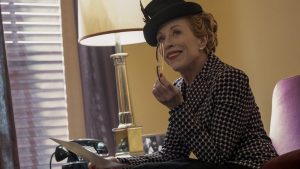The Reel Review
What if post-World War II Hollywood had possessed the courage to end discrimination towards women, minorities and gay people? What sort of world would it have created? Such are the questions posed in this revisionist Netflix mini-series from co-writer/director Ryan Murphy (American Horror Story, Glee), blending real life and fictional characters.
The seven episode mini-series starts off with a big bang, riffing on the famed story of Scotty Bowers, who ran a high-end brothel out of a gas station at the corner of Hollywood and North Van Ness in the 1940s that claimed such high profile clients as Cole Porter and Rock Hudson. Murphy’s campy, titillation train chugs along for a couple more episodes, incorporating famed director George Cukor’s weekly, Sunday night, gay pool parties and predatory super agent Henry Willson’s well-known casting couch for leading men clients such as Hudson.
But around episode four, something unusual happens – Hollywood’s sexually provocative salaciousness melds into a more serious, script flipping story, as Patti LuPone’s Avis Amberg suddenly ends up studio head and the revisionist evolution gets underway, where the most talented – among them women, minorities and gays – are finally justly rewarded.
Compelling performances from acclaimed Broadway standouts LuPone, Joe Mantello, and Holland Taylor, as well as Dylan McDermott and Queen Latifah, help offset an outrageously off-putting, cartoonish performance from Jim Parsons (The Big Bang Theory). (And it isn’t because of the intense unlikability of his character Henry Willson – Parsons delivers his crass one-liners as though he is awaiting a laugh track and that Salomé dance scene is cringeworthy.) With a plot that seems like an odd mashup of Quentin Tarantino’s Once Upon a Time in Hollywood and 9 to 5 (yes, you read that right), and featuring an abundance of eye-rolling hokeyness, Murphy’s Hollywood is far from perfect. But its fun, feel good ending does give us hope that maybe movies really can help better the world.
REEL FACTS
• Other facts of the heavily-fictionalized Hollywood: Anna May Wong gave up major blockbusters after being passed over for the lead in the 1935 film adaptation of Pearl Buck’s The Good Earth, Gone With The Wind star Vivien Leigh was bipolar, Hattie McDaniel did have to sit at a table separate from her castmates at the “Whites Only” hotel venue when she made history in 1940 as the first black Oscar winner, and Rock Hudson didn’t come out as gay until his death from AIDS at age 59 in 1985.
• Hollywood is the latest from producer Ryan Murphy’s $300 million, five year contract with Netflix – the richest producing deal in television history. Other recent Murphy-produced Netflix programs include the LGBTQ documentaries A Secret Love and Circus of Books.

• Costume designers dressed Holland Taylor in clothing replicated from photographs she shared of her mother from the 1930s and 40s. About half of the costumes in Hollywood were handmade.



